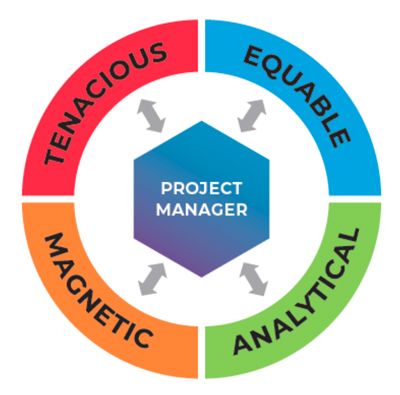
A New Tool for Project Managers: T.E.A.M.
For over 25 years, I worked as an IT project manager and consultant throughout the United States in various companies and corporate cultures. I have helped teams in projects which involved difficult installations, relocation of data centers, deployment of new software, and cybersecurity amongst others. I also worked as a technical resource for many years, which allowed me to understand the technical and management aspect of IT projects.
Surprisingly, my biggest challenge in each assignment was not the mission itself but understanding the various personalities I had to manage in each situation. Nothing can sink a project faster for a project manager than a contentious team that will not cooperate with the project manager or the team itself. I quickly realized that in order to succeed, I had to learn how to decode the personalities of the people I needed to work with to complete my mission.
Over the years I’ve developed my own type of personality decoder called T.E.A.M., to help understand the variety of people and personalities that I work with on a daily basis. Recently, I’ve encapsulated my system into a book about T.E.A.M. that is available on this website or on Amazon entitled, “T.E.A.M.: An IT Project Manager’s Guide to Relational Excellence.”
For me, the importance of relational excellence for a project manager cannot be overstated and encompasses all the things that build a strong, cooperative relationship: conflict management, understanding another’s values, likes, dislikes, and most effective working conditions. It’s also important to note that we do not encounter the same types of people in every phase of the project management process. So while the more assertive and results-driven personalities like attorneys and CIO’s may be found in the initiation stage, more introspective, detail-oriented people may be found in the monitoring and control phase. T.E.A.M. addresses ways to handle these personalities within each of the project management phases.

So what is T.E.A.M.? It’s an acronym for the four types of personalities I have consistently detected throughout my 25+ years as an IT Project Manager. It stands for:
“T” for TENACIOUS
People who fall into the “Tenacious” category are movers and shakers. They are defined by their tenacity, directness, decisiveness, and results-driven values. They love to win and are motivated by competition. They value competency, concrete results and personal freedom. They are sometimes seen as pushy when trying to get what they want. Typically, the best way to communicate with a “T” is to give them the bottom line. They appreciate brevity and focus on presenting information. Try not to make generalizations and try not to repeat yourself. Focus on solutions, rather than the problems.
“E” for EQUABLE
Equable personalities are calm, patient, predictable, deliberate, and stable. They are warm and loyal, and often passive. They are motivated by cooperation and opportunities to help out where they are sincerely appreciated. They value loyalty, helping others, and security. Be personable and express your interest in equable persons. Tell them what you expect, politely, and take time to provide clarification. Avoid confrontation and aggression to gain cooperation.
“A” for ANALYTICAL
People who fall into the analytical category are the ones who make sure everything is done correctly. They are cautious, systematic, and detailed. They tend to be private, reserved people and are objective. They are diplomatic in their dealings with others, and are motivated by the opportunity to show knowledge, expertise, and quality work. “A’s” love facts and details, so when communicating with them, providing information is the way to their heart! You can minimize the pep talk and emotional language and instead concentrate on being patient, persistent, and diplomatic.
“M” for MAGNETIC
The magnetic personality style uses charm and collaboration to work with others. They are collaborative and people find them energizing to be around and work with because of their enthusiasm and optimism. They are also impulsive, persuasive, and trusting of those around them. They value social recognition, group activities, and relationships. They respect coaching and counseling, freedom of expression and individuality. Magnetic people like you to share your experiences or offer anecdotal evidence for your solutions. Allow them time to ask questions, but focus on the positives and try not to overload them with details.
Rarely does a person exclusively fall into one of the areas. Still, it’s important to understand where you predominantly fall yourself so that you can recognize where your personality traits may mesh well or clash with some of your other teammates. Most people show a blend of characteristics from all four. There is no single area with “preferred” characteristics over another in a collaborative endeavor; they are all valuable and bring important characteristics to the table.
If you know and understand the personalities on your team, you will be able to better work with them throughout all phases of the IT project management experience: initiation, planning, execution, monitoring and control, closure. Guaranteed!
Are you wondering whether you are a T,E,A, or M? Or are you sure you know? I have developed a fun to do personality assessment that will tell you where you stand on the T.E.A.M. spectrum. Try the personality assessment here. Then download the ebook or purchase the paperback on Amazon to get your “Guide to Relational Excellence” for your specific personality type. It will give you recommendations and ideas on how to optimally manage team members of all four personality types within each phase of the project management process. The book also gives great examples of team compositions of different personalities and how to navigate those in different project management phases as well. Keep in mind that by reading this book you can earn 1 PDU per hour of reading.
Project management excellence means excellence with the T.E.A.M. too! If you would like to learn more about T.E.A.M. or would like to arrange a T.E.A.M. training session for your group, contact us today at (630) 300-8828.
